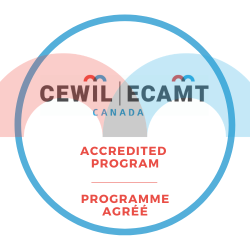Chemical Laboratory Technology - Science Laboratory (Co-op)

*Domestic applicants include Canadian citizens, permanent residents, protected persons and Convention refugees.
At the heart of every scientific or technological discovery is a laboratory technologist. If you enjoy research and laboratory analysis, the Fanshawe Chemical Laboratory Technology - Science Laboratory program is the right fit for you.
Over three years and up to 16 months of paid co-op placement, you'll build a sound basic knowledge of biology, chemistry, mathematics and physics, with emphasis on the principles and performance of standard lab practices, procedures and techniques for biological, chemical and physical analysis. Your lab tech training will also include hands-on application of your theoretical knowledge, using our state-of-the-art instrumentation. As you progress through your lab courses, you will study advanced topics such as biochemistry, molecular biology and modern physics, while developing the soft skills necessary to be successful in any professional environment.
You'll graduate with a dynamic set of lab skills, preparing you to start your career in a variety of laboratory environments like applied research and development, educational, process and quality control, as well as food and beverage industries, petrochemical companies or technical sales.
This three-year program provides students with an understanding of the practical science of biology, chemistry, mathematics and physics, and emphasizes the principles and performance of standard laboratory practices, procedures, and techniques for biological, chemical and physical analyses. If you're considering further academic study, graduates may choose to pursue Fanshawe's Bachelor of Applied Technology (Biotechnology) degree or one of our articulation agreements with select universities.
Graduates of Fanshawe's Chemical Laboratory Technology - Science Laboratory program will have the knowledge and set of dynamic lab tech skills to seek out employment opportunities in industrial plants, research laboratories, process and quality control laboratories, product development, technical sales and more. Graduates may find themselves in positions including laboratory assistant, research assistant, applied research and development laboratory technologist, process and quality control laboratory technologist, food and beverage industry technologist, petrochemical company laboratory technologist and technical sales manager.
Did you know Fanshawe consistently ranks high in graduation employment rates among large colleges in Ontario?
Here are some examples of career opportunities for graduates of Fanshawe’s Chemical Laboratory Technology program:
Technical Sales Manager
Be responsible for daily given tasks related to technical sales including analyzing competitors, developing sales opportunities and closing new accounts.
Laboratory Assistant
Help scientists and medical professionals with daily lab duties and responsibilities including data entry, blood collection, processing and moving specimens and preparing special chemicals for use in laboratory testing.
Research Assistant
Be responsible for recruiting participants, data management, conducting literature searches, preparing progress reports and preparing materials for submission to granting agencies and foundations.
Petrochemical Company Laboratory Technologist
Utilize scientific principles to solve technical problems efficiently and safely at the best cost.
| Fall | Winter | Summer | |
| Year 1 | Start Level 1 | Class Level 2 | Class Level 3 |
| Year 2 | Co-op | Class Level 4 | Co-op |
| Year 3 | Co-op | Class Level 5 | Co-op |
| Year 4 | Class Level 6/End | N/A | N/A |

This program is accredited by Co-operative Education and Work Integrated Learning Canada. This accreditation represents the highest standard of achievement for co-operative education programs in Canada, and recognizes Fanshawe's commitment to excellence.
The graduate has reliably demonstrated the ability to:

Join Us for Open House
Find out if Fanshawe is the right fit for you at Open House. Explore Fanshawe's campuses, meet faculty and current students, and ask your questions about starting college.
Amy Turnbull
Ontario Secondary School Diploma (OSSD), or equivalent, or a mature applicant with the following courses:
- Grade 11 or 12 Chemistry (C or U)
- Grade 11 Math (U or M - minimum of 60%), or Grade 12 Math (C* or U)
* MCT4C is the preferred college level math to ensure adequate academic preparation for this program.
Students who do not meet the admission requirements are recommended for academic upgrading. A conditional offer may be possible with proof of enrolment. Alternatively, applicants may choose to do the one-year Trade Fundamentals preparatory program that provides all the admission requirements for this program.
Note:
Graduates of this program may choose to pursue Fanshawe's Bachelor of Applied Technology (Biotechnology) degree program.
| Test | Score |
|---|---|
| TOEFL iBT | Overall score of 4.5 with no score less than 4 in any band |
| IELTS Academic | Overall score of 6.0 with no score less than 5.5 in any of the four bands |
| CAEL | Overall score of 60 with no score less than 50 in any of the four bands. score of 80 in listening |
| PTE Academic | Minimum score of 53 with no score less than 45 in any of the four bands |
| Cambridge English | Overall score of 169 with no language skill less than 162 |
| ESL4/GAP5 | Minimum grade of 80% in Level 8, 75% in Level 9, or 70% in Level 10 |
| Duolingo | Overall score of 105, with no score lower than 95 |
| LANGUAGECERT | Overall score of 65 with no score less than 60 in any of the four skills |
| Level 1 | ||||
| Take all of the following Mandatory Courses: | ||||
| BIOL-1016 | Cytology | 4 | ||
| This is an introductory course in biology where the study is limited to basic biological process occurring at the cellular level. The topics discussed will include cell structures and their function, structure and formation of macromolecules; energy procurement, release and utilization; DNA structure and protein synthesis; Mendal's Laws and inherited characteristics; and Genetic diseases and their causes. | ||||
| CHEM-1003 | General Chemistry 1 | 4.5 | ||
| This course covers the basic concepts of matter, quantitative interpretation of chemical reactions, behaviour of gases, composition of atoms and their electron configurations and chemical bonding. Laboratories provide opportunities to develop laboratory techniques while working on experiments related to theory discussed in lectures. | ||||
| WRIT-1039 | Reason & Writing 1-Technology | 3 | ||
| This course will introduce technology students to essential principles of reading, writing, and reasoning at the postsecondary level. Students will identify, summarize, analyze, and evaluate multiple short readings and write persuasive response essays to develop their vocabulary, comprehension, grammar, and critical thinking. | ||||
| MATH-1172 | Math 1 | 5 | ||
| As the first of two pre-calculus mathematics courses, content covered includes treatment of data, fundamental algebra, radicals and logarithms. Application of problem solving skills, such as the quadratic formula, as related to scientific analysis will be emphasized. | ||||
| ENVR-1014 | Environmental & Science Issues | 3 | ||
| This course provides a comprehensive understanding of the parameters and problems surrounding major environmental issues. This understanding will enable the student to evaluate different courses of action that can be undertaken in decision making practices. | ||||
| SKLS-1020 | Fundamentals of Science | 1.5 | ||
| This course introduces the student to basic concepts and skills needed for success in any science of technology field. Emphasis will be given to systems of measurement, basic statistics, data interpretation, and computer applications including MS Word and Excel as applied to laboratory technology. | ||||
[1] Total program costs are approximate and subject to change. They do not include additional fees such as the health and dental plan, bus pass, or general expenses. Learn more about ancillary and additional fees.